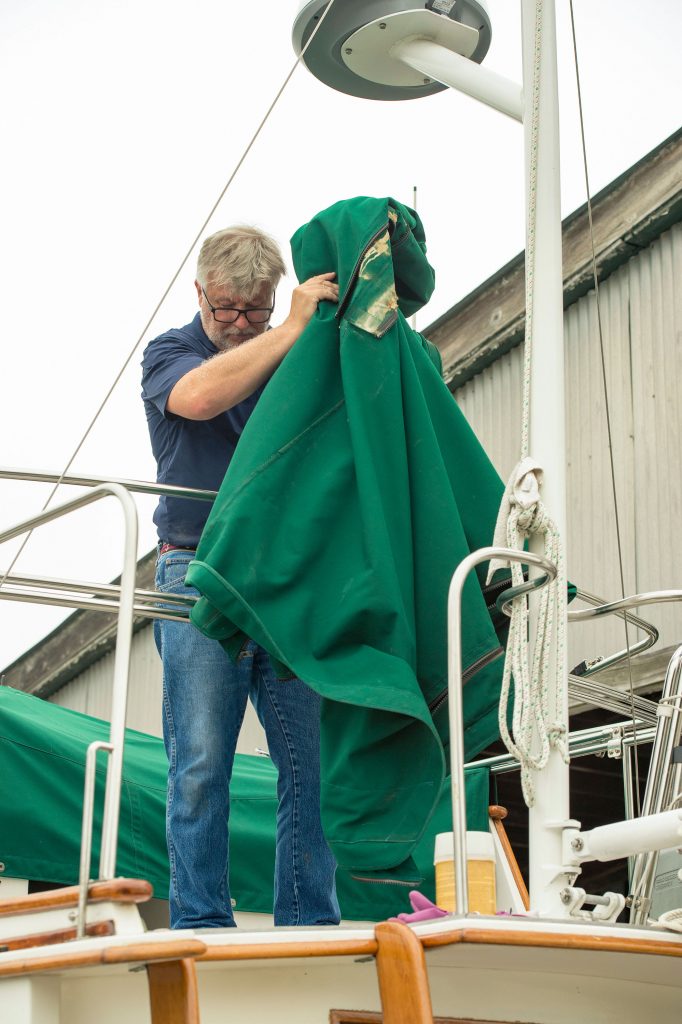
Removing windage such as canvas enclosures, bimini tops and sails can help your boat survive a hurricane.
When a hurricane approaches, recreational boat owners have a big problem. Faced with limited time to protect their homes, and with families to possibly evacuate, what can they do to prepare their boats? The nation’s largest boating advocacy, services and safety group, The Boat Owners Association of The United States (BoatUS), says you only need to look at last year’s hurricane season to find answers. And with the 2019 Atlantic hurricane season beginning June 1, BoatUS has some valuable preparation tips for boat owners.
On September 14, 2018, Hurricane Florence lumbered ashore near Wrightsville Beach, North Carolina. As soon as the water receded, the BoatUS Catastrophe Team (CAT Team) arrived to begin the task of recovering its insured vessels. After most major storms, the damage is often widespread, with hundreds of boats stacked on each other, sinking, or even in backyards.
While the team found some severe damage at marinas, many boaters had sought protection from the storm by removing their boats from the water. Ashore, the team found marina parking lots crowded with stored boats. Many boat owners simply took their boats home and parked them in driveways, on streets or in the middle of open fields, away from falling trees. Catastrophic total losses, or those vessels that were totally destroyed, appeared to be minimal. Lesser damage meant boaters could get back on the water sooner.
“The combination of many vessels being a trailerable size, and that people in this part of the country are accustomed to hurricanes, helped,” said BoatUS CAT Team leader Mike McCook. “They recognized the warnings, had plans already prepared, and efficiently did what needed to be done.”
So what can boaters do this hurricane season?
- Get your boat out of the water. The No. 1 way to reduce the potential for boat damage is to remove it from the water and store ashore on the highest ground possible. If you own a boat trailer, ensure it’s ready to go at a moment’s notice. If you don’t trailer, ask your marina to be put on a priority list for storm haulouts, sometimes referred to as “hurricane clubs.” Ensure your boat’s insurance policy will help to pay for the haulout so it’s an easy decision to make. The BoatUS Marine Insurance Program pays 50 percent of the cost of labor, up to $1,000, to have the boat hauled or moved to the safety of a hurricane hole, and the haulout does not penalize the policyholder. Once ashore, removing windage, such as biminis and sail furlers, and anchoring the boat to the ground with strapping has proven to reduce damage from high winds.
- If you’re not going to haul, make your in-water plan now. Some marinas, such as those that offer protection and have tall pilings with floating docks fare better than marinas with low seawalls and fixed docks or floating docks with short pilings. Use the free BoatUS hurricane planning guides at BoatUS.com/Hurricanes to learn how to protect your boat in a slip, canal, or protected hurricane hole. Get supplies now, such as extra docklines and chafe protection, and have them ready to go in an easy-to-find location. Another lesson learned from the CAT Team: Don’t leave your boat in a boat lift.
- Download the free BoatUS App and sign up for storm alerts. You’ll be notified of any storms potentially headed your way and updated on the storm’s track and intensity.
- Have a good insurance backstop for when all else fails. Your last line of hurricane defense is your boat’s insurance policy. Ensure that it includes full salvage coverage that is equal to the policy’s hull coverage. Lesser policies limit salvage coverage to either a small percentage of the boat’s insured hull value, perhaps just 5% to 10%, or may subtract salvage costs from the insured value of the boat, reducing the funds available to repair the boat or the amount paid if the boat’s declared a total loss. Additionally, be aware of boat insurance named storm deductibles. In the eventuality there ever is a storm claim, some insurers may lower the deductible and reward boat owners who show that they have taken additional measures to prepare for the storm, such as hauling, lashing down, removing windage or other protective measures.

